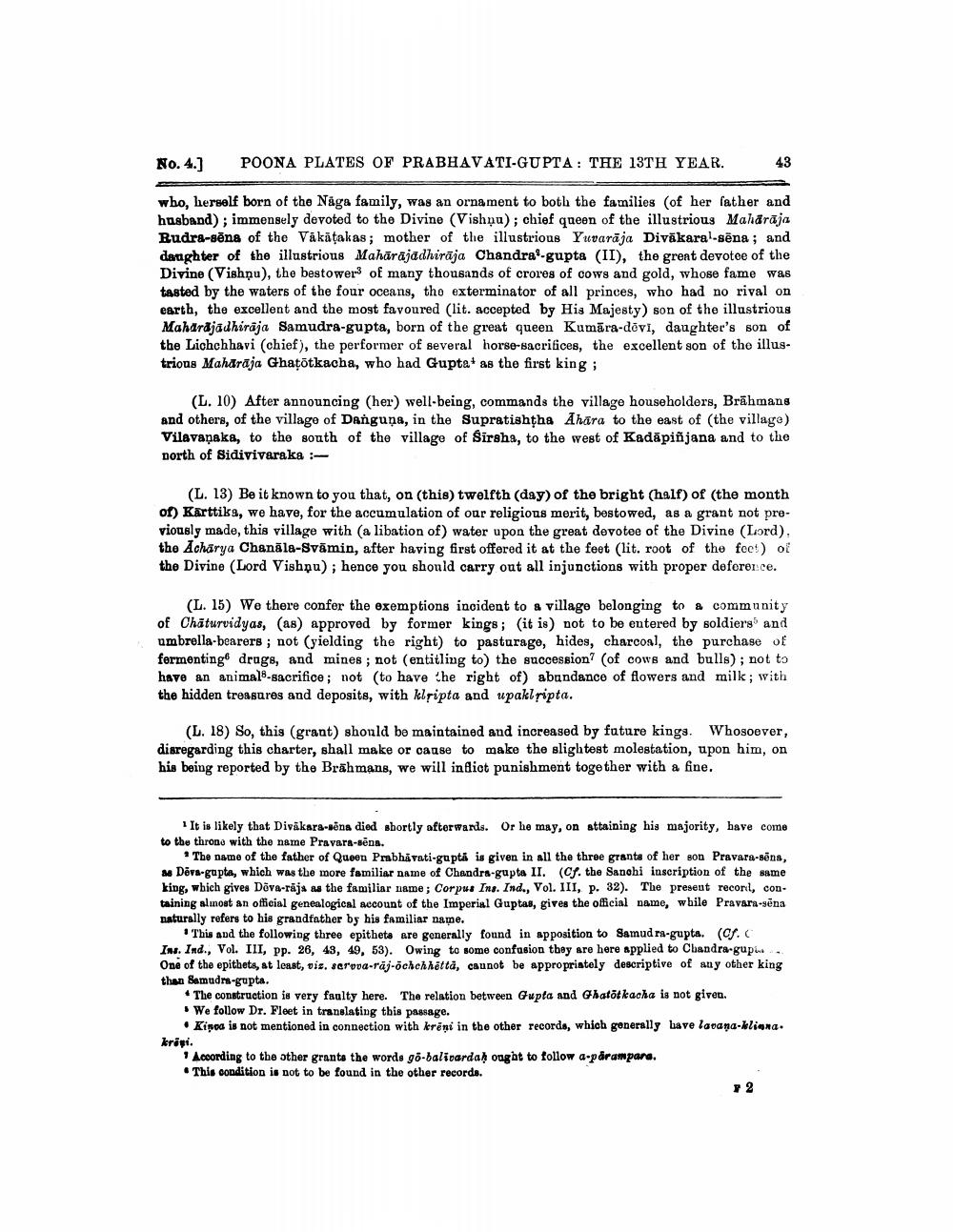________________
No. 4.]
who, herself born of the Naga family, was an ornament to both the families (of her father and husband); immensely devoted to the Divine (Vishnu); chief queen of the illustrious Mahārāja Rudra-sena of the Vakaṭakas; mother of the illustrious Yuvaraja Divakara1-sēna; and daughter of the illustrious Maharajadhiraja Chandra-gupta (II), the great devotee of the Divine (Vishnu), the bestowers of many thousands of crores of cows and gold, whose fame was tasted by the waters of the four oceans, the exterminator of all princes, who had no rival on earth, the excellent and the most favoured (lit. accepted by His Majesty) son of the illustrious Maharajadhiraja Samudra-gupta, born of the great queen Kumara-devi, daughter's son of the Lichchhavi (chief), the performer of several horse-sacrifices, the excellent son of the illustrious Maharaja Ghatotkacha, who had Gupta as the first king;
POONA PLATES OF PRABHAVATI-GUPTA: THE 13TH YEAR.
(L. 10) After announcing (her) well-being, commands the village householders, Brahmans and others, of the village of Danguna, in the Supratishtha Ahara to the east of (the village) Vilavanaka, to the south of the village of Sirsha, to the west of Kadāpiñjana and to the north of Sidivivaraka :
43
(L. 13) Be it known to you that, on (this) twelfth (day) of the bright (half) of (the month of) Karttika, we have, for the accumulation of our religious merit, bestowed, as a grant not previously made, this village with (a libation of) water upon the great devotee of the Divine (Lord). the Acharya Chanala-Svamin, after having first offered it at the feet (lit. root of the feet) of the Divine (Lord Vishnu); hence you should carry out all injunctions with proper deference.
(L. 15) We there confer the exemptions incident to a village belonging to a community of Chaturvidyas, (as) approved by former kings; (it is) not to be entered by soldiers and umbrella-bearers; not (yielding the right) to pasturage, hides, charcoal, the purchase of fermenting drugs, and mines; not (entitling to) the succession? (of cows and bulls); not to have an animals-sacrifice; not (to have the right of) abundance of flowers and milk; with the hidden treasures and deposits, with klripta and upaklṛipta.
(L. 18) So, this (grant) should be maintained and increased by future kings. Whosoever, disregarding this charter, shall make or cause to make the slightest molestation, upon him, on his being reported by the Brahmans, we will inflict punishment together with a fine.
It is likely that Diväkara-sena died shortly afterwards. Or he may, on attaining his majority, have come to the throne with the name Pravara-sēna.
* The name of the father of Queen Prabhavati-gupta is given in all the three grants of her son Pravara-sena, as Deva-gupta, which was the more familiar name of Chandra-gupta II. (Cf. the Sanchi inscription of the same king, which gives Dova-raja as the familiar name; Corpus Ins. Ind., Vol. III, p. 32). The present record, containing almost an official genealogical account of the Imperial Guptas, gives the official name, while Pravara-sēna naturally refers to his grandfather by his familiar name.
This and the following three epithets are generally found in apposition to Samudra-gupta. (cf.c Ins. Ind., Vol. III, pp. 26, 43, 49, 53). Owing to some confusion they are here applied to Chandra-gupi One of the epithets, at least, viz. servva-raj-ochchhettä, cannot be appropriately descriptive of any other king than Samudra-gupta.
kräpi.
The construction is very faulty here. The relation between Gupta and Ghatotkacha is not given. We follow Dr. Fleet in translating this passage.
Kinea is not mentioned in connection with kreni in the other records, which generally have lavana-klinna.
According to the other grants the words gō-balivardaḥ ought to follow a-parampara. This condition is not to be found in the other records.
2




